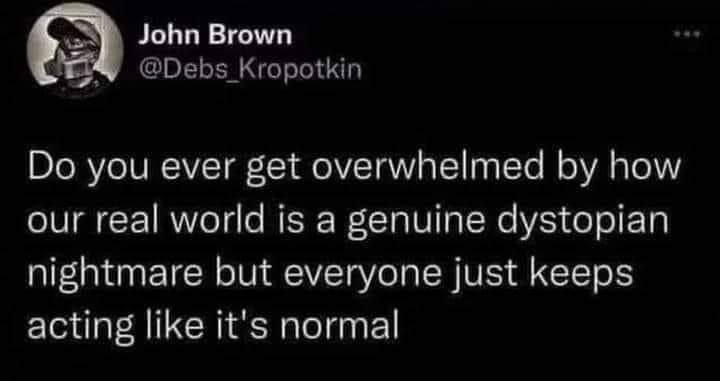this post was submitted on 13 Jun 2024
1571 points (96.3% liked)
memes
10081 readers
2101 users here now
Community rules
1. Be civil
No trolling, bigotry or other insulting / annoying behaviour
2. No politics
This is non-politics community. For political memes please go to !politicalmemes@lemmy.world
3. No recent reposts
Check for reposts when posting a meme, you can only repost after 1 month
4. No bots
No bots without the express approval of the mods or the admins
5. No Spam/Ads
No advertisements or spam. This is an instance rule and the only way to live.
Sister communities
- !tenforward@lemmy.world : Star Trek memes, chat and shitposts
- !lemmyshitpost@lemmy.world : Lemmy Shitposts, anything and everything goes.
- !linuxmemes@lemmy.world : Linux themed memes
- !comicstrips@lemmy.world : for those who love comic stories.
founded 1 year ago
MODERATORS
you are viewing a single comment's thread
view the rest of the comments
view the rest of the comments

You've found consistent rules for how your brain assembles your perceptions. You have not found any evidence, ever, that anything exists outside your brain. You're just assuming that your brain consistently interprets a consistent world, instead of the simpler explanation that your brain creates a consistent world. It's two assumptions versus one. Occam's Razor says your perceptual world isn't real. And so does the Fitness Beats Truth theorem. You have absolutely no evidence, and you're arguing against Occam's Razor and against the only evidence that we do have.
Moreover, from that point of view, there is no guarantee my brain even exists and is what I think with.
But that doesn't matter for the substance of discussion, really. Whatever I perceive is the evidence of something that is real, as said evidence is repeatedly presented to my consciousness, following the rules. If my mind is the source of the reality, it doesn't change the fact that said reality operates by certain rules that can be devised using evidence.
I think, therefore I exist, as Descartes said. My mind is real. And whatever is consistently presented to me, following certain rules, is very certainly real, too. Same can't be said of dragons or magic, for example. There is no evidence - in the world or in my perception of it - for their existence, and I can't rule them in solely based on the fact I made it up in my imagination.
If you're lost in what I'm saying, try to spawn a dragon right next to you, in the world you perceive as physical, not in your imagination. Next, try to boil water in a kettle. See the difference? One never happens, unless you're hallucinating, and the other always succeeds if you do everything correctly. The second, thereby, can be seen as a likely rule of the world's functioning, a natural law, regardless of anything else.
Okay, so let's call reality your mind's experiences, operating according to your mind's rules.
If you find the techniques and tools for controlling your mind, you'll have control over reality. Why wouldn't you go take that power and make the world a better place? Rejecting power over your mind's reality seems to me as nonsensical as rejecting electricity or antibiotics or eyeglasses. It's a form of primitivism, the political ideology of the Unabomber. WHY!?!?!?!
First, you jump to the conclusion that your mind really is a source of reality. That's a big leap, and I don't think you used Occam's razor well here. Besides, this approach is wildly oversimplified, and shouldn't be used as a proof in itself.
Second, at the time there is zero evidence of mind alteration bringing tangible change to the perceivable world. Spawn me a dragon, or teach me to spawn one, here, in this very proven plane of existence, and we'll talk.
For now, there is no evidence I actually miss out on anything.
There's evidence. It's called the placebo effect.
The placebo effect is a simple psychological phenomenon affecting only the human body itself (i.e. not bringing changes to the world outside the body itself, which is literally directly regulated by the nervous system), and requiring a total of zero supernatural things.
It's just the interaction of the nervous system with various organs of the body. Aside from placebo and nocebo, this may also lead to psychosomatic disorder, and long-term stress wear and tear. Certain expectations or stressors influence the way organs are regulated, which may lead to positive or negative outcomes depending on the context.